#for western democracy of course
Text
People honest to fuck keep telling me "But Hamas WANTS this war/as many Palestinians to be killed as possible!"
And like.
??????
So we are now doing EXACTLY what we convinced ourselves some Evil Enemy Force is secretly or not so secretly wanting us to do - commit absolute atrocities and human rights violations en masse - because at least we're doing it for. what. To bring Peace and Democracy? Enlightened Western Values? Freedom from the Evil Enemy Force that DEMANDS we do exactly the brutality we're getting away with?????
What kind of logic system is this supposed to be???
"Every Muslim should come out and publicly Condemn Hamas, else they're basically Terrorists - oh but don't you see, Hamas WANTED us to bomb this NICU, they DEMANDED we leave these babies on ventilators to starve, suffocate and ROT surrounded by the things their now-also-dead parents brought them, HAMAS wants us to do all of this and so we obliged! All hail the Western Democracies and their endless pursuit of human rights and liberty!!!"
You lie to me that "we" are the bastion of humanity's human rights, but your definition of "human" doesn't include even NICU babies if they are inconvenient (and don't fall under your definition of "Western").
Fuck all of this.
"Hamas wants this, so that's what we should do. Oh but anyone criticising this bombing campaign in any way is Hamas AND A TERRORIST!!! MORE BOMBS!!!"
#fuck the entire system#i feel so so so so so so fucking stupid#germany is on the forefront of course in hopes of magically making the crime of the holocaust go away#by trying to pass it onto whoever is convenient#the conspiracy theory that ACTUALLY 'The Arabs' MADE nazi germany carry out the holocaust is spreading#insane shit just insane just absolutely bloodthirsty monstrous#no our grandparents and great grandparents and people who are still alive very much thought the holocaust was a good idea#you can't wash this from your family history by murdering Palestinian preemies now#for western democracy of course#despicable#german guilt#palestine genocide#'hamas made me do it!' you are a joke#but a dark and murderous one#all bombing of civilians always is bad and you will never convince me that one atrocity against humans gets justified by another#in 10 years time when crocodile tears roll and this is rightfully treated as a murder campaign against millions of people based on culture#i hope you'll be haunted by their shadow telling you 'you knew and you were complicit'#we are all complicit#favoured in the world order again that we made up by might is right#western supremacy bullshit#genocide
12 notes
·
View notes
Text
zionists love the pinkwashing angle so much you would think israel has the most queer-friendly policies on earth but they don't even have gay marriage there
#like okay ig...#i get the strategy it's the whole we're the only democracy in the middle east it's actually just like europe here arabs are so uncivilized#we hate them even though we literally live here thing#which is like straight out of the colonizer handbook. as is everything else they do#but i mean wouldn't that be the bare minimum for the we love gay people here they hate gay people there pr campaign#and the pinkwashing works i've literally seen it from people who would be my mutuals' mutuals. this summer. just crazy#but it's not surprising that it would work on white gays or just western gays because people will do tiktoks about how they're 'illegal in#74 countries!' (idk how many it is) like they're the victims (when it's countries they'll never go to) not the actual gay people who live#there#which is just so telling#and queerness/other things like feminism being weaponized is always so frustrating you'll literally see people who hate the gays every#day of the year pretend they're gay rights activists in the name of killing palestinians. and in the name of colonialism in general#and of course even if you could get gay married there that wouldn't make it better. but you can't even do that so like. okay ig?#do you think gay israelis are effectively utilizing gay power by killing the people whose land they've been colonizing for decades#and like i say: brf slt
37 notes
·
View notes
Text
Something I haven’t seen talked about is that the Super Bowl Americans distracted themselves with during the terror bombing of Rafah—the latest manifestation of the Gaza Genocide—featured the “Chiefs,” named for the victims of US genocide, and the “49ers,” named for an instigating faction in the California Genocide.
I saw this map today
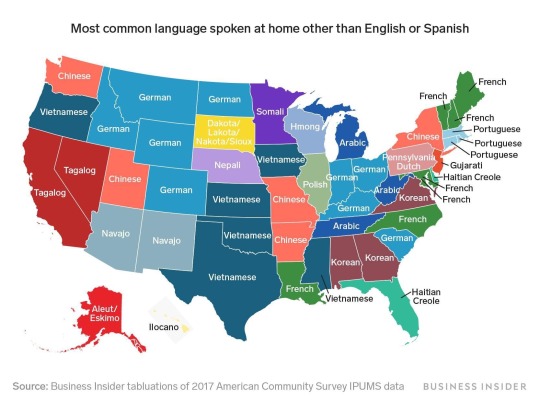
Of the THIRD most spoken language behind English and Spanish in every state. Notice of course that the languages reflect massive displacements from victims of US empire, but also that more states’ tertiary language is German or French than an indigenous language.
The American ideology and its representative culture factually inspired the Holocaust. The American West was the model for the Nazi East.
Trump lost in 2020 and the US is still enabling a genocide, despite ostensibly being “anti-fascist.”
The United States IS genocide. Its biblically-esteemed founding documents prescribe ethnic cleansing and apartheid. The American soldier, subject to bipartisan fawning, is the universal symbol not of freedom and democracy, but of oppression and tyranny.
Any critical lens beyond the usual Western hagiography will show that fascism did not lose the Second World War, it just evolved into liberalism.
1K notes
·
View notes
Text
Current mood as an anti Russia Russian jew:
- Watching western college kids spout the same propaganda you heard on channel one growing up
- Hearing chants of "Death to America" and seeing the destruction of the American flag and whispering "of course" to yourself because you know exactly where this rhetoric came from and who sponsored it
- Watching the world waste its time on a democratic country fighting back against terrorists instead of paying attention to the real evil in the world like Russia, Iran, or China, because... antisemitism is more entertaining and you guys haven't been allowed to kill jews in a while I guess
- Being frustrated by the protests because nobody exerted this much energy on Ukraine and everybody has already forgotten about Ukraine and it's so painfully obvious that you all just hate jews
- Remembering the time you sat in class and had to listen to your professor say shit like "America is the greatest evil", and "America is committing modern day colonialism through globalization and global market" and then comparing that rhetoric to that of the brainwashed western college kids'
- Being terrified of the upcoming 9th of May because you have no idea what kind of shit your country will pull on the 9th of May
- Being very familiar with Islamic fundamentalism because you live near Chechnya and for as long as you remember you have been witnessing the murder of human rights' activists, attacks on lawyers, and young women and girls trying to escape families who promised to honor kill them, mutilated them or poisoned them with medicine - some successfully crossing the border to Georgia but many more being dragged back to Chechnya from where they were hiding in Moscow and St Petersburg to their deaths
- And then watching the west pretend that there is no extremism or problems because then you will be called a bunch of names and obviously that's very scary 👍
- Realizing you have nowhere to run because the west has been thoroughly infiltrated and is digging itself a grave and hasn't stopped doing so for 8 months now
- Losing friends because they either fell for the propaganda and don't see the danger you see so clearly, or they are too cowardly to call out the mob and lose followers on social media. Even though losing followers will be the least of your fucking problems when you lose your democracy and freedoms
- Being furious 24/7 because more sane people aren't standing up, again afraid of the mob and losing their social media status
- Honestly just expecting to be bombed by now
#в добрый путь как говорится#да я в депрессии спасибо что заметили#antisemitism#leftist antisemitism#russia#world problems#western idiocy#jumblr
752 notes
·
View notes
Text
i learned what is the most bizarre government in world history?
A bit strange that no one speaks of Italian city-states here.
I think they tried just every conceivable form of government. I will tell a bit about my dearest Florentine Republic.
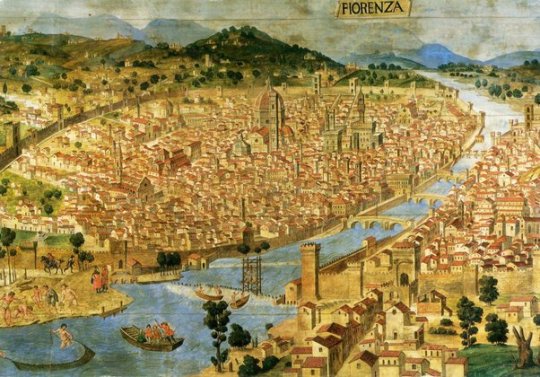
In 13th century, Italian city-states witnessed an intense fight between pro-Emperor and pro-Pope factions. Most nobles were pro-Emperor. Florence was one of the places where they lost the battle, which led to the establishment of democracy.
Of course, this democracy was very different from what we call democracy today. Modern Western countries are representative democracies where people only vote in the elections and countries are governed by professional politicians. A medieval Italian would call such system aristocratic.
Of course, Florentine democracy was also exclusive. Wage labourers, people in debt and women were excluded. But all others could directly participate in government of their country: 5,000–8,000 people out of 25,000–50,000 adult citizens.
Political parties were forbidden (actually, the word party was invented as a slur, something that people do not remember now). Elections were seen as aristocratic mechanism because the rich and the educated would be capable to convince or bribe others to vote for them. So the main mechanism of democracy was casting lots.
Florence was subdivided into four quarters, sixteen neighborhoods and twenty-one corporations (seven major ones representing rich citizens and fourteen minor ones representing poor citizens): every citizen was a member of one of those. Initially, corporations had something to do with profession. Nobles renounced their nobility and joined corporations to be able to participate in the government. For instance, nobleman Dante Alighieri entered the corporation of Doctors and Apothecaries, and the ancestors of Niccolo Machiavelli registered in the corporation of Winemakers.
The main government body was Signoria. It consisted of eight Priors (two representing every quarter, six representing major corporations and two representing minor corporations) and one Gonfalonier of Justice, the chairman. They ruled the city during the period of two months only and then replaced by others. Signoria was the main legislative and executive authority. However, it could take major decisions only in common with other bodies such as Twelve Good Men (three persons from every quarter, mostly rich people) and Sixteen Gonfaloniers (one from every neighbourhood). These three bodies (Signoria, Twelve Good Men and Sixteen Gonfaloniers) were all chosen by lot: notes with their names were chosen from special leather bags preserved in the sacristy of the Santa Croce cathedral.
The laws were approved by the Council of the Commune (192 people, 48 from every quarter, majority rich) and the Council of the People (160 people, 10 from every neighbourhood, majority poor).
There was an enormous quantity of other governing bodies that regulated everything that needed to be regulated in the Republic, from quality checks of the bread to the licensing of the sex workers. In most cases, people served from three to six months. It meant that every full-fledged male citizen of the Florentine Republic could hope to be chosen for one of these positions.
The judicial and military power belonged to the podestà, a foreign citizen with good reputation, legal education and a military company or at least a group of armed servants. Florentines believed that a foreigner would be a more impartial judge in Florentine discussions. A podestà was invited to Florence for six months.
Finally, the Medici family managed to circumvent the system and become rulers of Florence but it took time. The system of checks and balances did work.
However, no one was able to circumvent the government system of Venetian Republic. Do you know why?
For more than five centuries (from 1268 to 1797) the procedure to elect the doge (chief of state) did not change.
Choose 30 members of the Great Council by lot.
These 30 people are reduced by lot to 9.
These 9 people choose 40 other people.
These 40 are reduced by lot to 12.
These 12 people choose 25 other people.
These 25 people are reduced by lot to 9.
These 9 people choose 45 other people.
These 45 people are reduced by lot to 11.
These 11 people choose 41 other people.
These 41 people elect the doge.
Funny that many Americans blame their electoral system for being complicated. You may think what you want about the Venetian system but it guaranteed what was probably the most stable government in the history of mankind.
By the way, despite the fact he was elected for life, the power of the chief of state in Venice was very much limited.
He could not appear in public without other officials present (security from populism). He could not meet foreign diplomats or open foreign dispatches without other officials present (security from collusion with foreign governments). He could not possess any property in a foreign land.
However, he had a nice place to live.
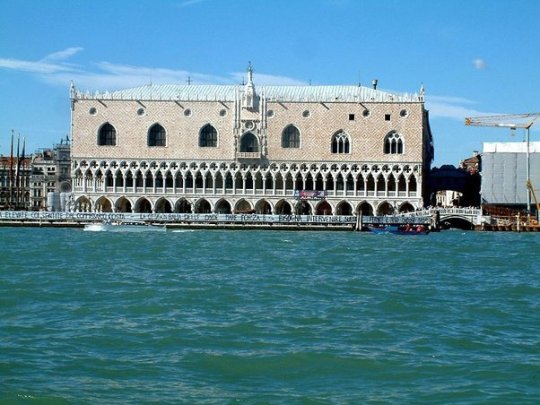
842 notes
·
View notes
Text
What "Communism never works" misses
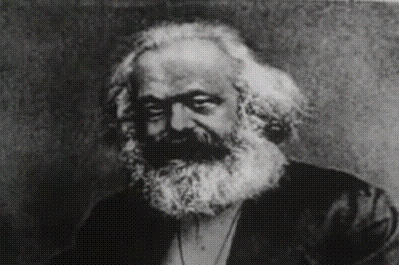
Okay, let me keep up the topic for the week and let me talk about one thing that will undoubtedly be thrown at anyone, who says something along the lines of: "Welp, the system is failing us. Maybe we should try communism." And that is: "Communism never works. It has never worked before!"
As someone, who had that argument thrown at them so many times before, I already know that for the most part it is useless to talk to someone who comes up with that argument. Because, well... here is the thing. The argument basically is a result of what amounts to brainwashing. The person will usually not know what communism is or how and why it has failed before. They will not know anything about communist parties or countries. And they usually do not want to know.
Usually they do not know, that communism was never tried before. Yes, several countries have tried to establish communism, but never got further than socialism. Nor do they know exactly, what the difference between all those different communist ideas are. And of course they do not know anything about the history of the USA (and other western countries) doing their best to suppress communism by any means necessary.
Which is the first thing that everyone, who uses the argument, misses. Basically...
If communism can never work, why does the USA try everything to stop anyone trying to establish it?
If it cannot work and will never work, they would not need to worry about it. It will just develop and then fail. Easy. No need to stage a coup d'etat against a democratically elected government. No need to snuggle up to fascist dictators. Just let the thing run its course and then maybe send some help, once communism has self-destroyed. Something that they say is inevitable.
But obviously they don't. So: Why?
It cannot be about saving some sort of democracy, because otherwise they would not help undemocratic forces to take over the country and allow them to hold it.
But there is another thing that the argument misses. And even bigger thing. Another question:
But does capitalism work?
Which is the thing that kinda gets left out of the discussion. Because even if we assume that communism could not work (doubtable)... There is the fact that capitalism does not work. Otherwise fascism would not again and again be established from capitalism. Otherwise capitalism would not have destroyed the planet. Otherwise capitalism would not kill millions of people per year.
See, people will always go big about the entire "Black book of communism" thing and eat it up, even though the book has so many issues in what it counts as "death from communism" - and that is even without going in the entire "communism was never established" thing. But even if we took the numbers at face-value... According to the book, communism has killed 100 million people.
Well, guess what. That is about the same number of people that capitalism kills in a decade. And while the black book of communism counts all those people killed by politics not necessarily linked to communism... Those 10 million dying of capitalism each year die of capitalism. They die because they have not money for medicine, they need to survive. They die, because they starve, while so much food is thrown away. They die of exposure to the elements, because they cannot afford a home. They die from the fallout of climate change.
So, yeah. First of all: Let's try out communism, before we argue that it cannot work.
But also: Realize, that capitalism does not work. Because it doesn't.

#capitalism#anti capitalism#communism#socialism#politics#anti colonialism#solarpunk#anarchy#anarchism
572 notes
·
View notes
Note
You’re thoughts on what’s taking place on college campuses and the anti semitism being blatantly displayed
There has been a major shift in the culture. In years past, whenever the Palestinian/Israeli conflict flared up, anti-Israeli sentiment in America was limited to the fringe of the Left; with both the political Right, and the mainstream political Left standing behind the only liberal democracy in the region, and both sides recognizing the cynical, self destructive tactics of Israel's extremist enemies which stalemate the situation (Hamas, The PLO and the PIJ).
But Gen Z goes into the evaluation of this long enduring conflict with a completely different mentality. That is because it has been significantly shaped by a radical cultural ideology according to which virtue comes from victimhood and suffering rather than from proper conduct. Individuals are entirely a product of their social circumstances (says Critical Theory) and the conduct of the oppressed is an expression of their desperation and suffering at the hands of powerful systems. Those systems are themselves the only truly “unethical” force that is in play, and they must be reformed in order to reform the individual. In the 2020 riots, violence (including against the livelihood of civilians) was justified by the cause: the alleviation of alleged suffering and oppression at the hands of law enforcement.
The Palestinian Israeli conflict plays into this Oppresser/Oppressed (stronger/weaker) narrative where there is no “morality” there is only “justice” (which means “equity”). It leads to a justification of a “By Any Means Necessary” ideology , just as long as the means is not sufficient enough to turn the stronger party into the weaker party. Israel is the powerful more militarily dominant liberal democratic nation so it must be to blame in this clash between itself and a poorer, chaotic struggling society. The advocate of traditional Western morality however judges each party whether small or great according to the morality of its intentional actions. According to that calculus Israel is, for the most part, a free nation attempting to defend its citizens, Hamas, The PLO and The PIJ are obscenely immoral terrorist organizations that intentionally target the innocent, and the Palestinian people are victims caught in the middle.
The truly unfortunate thing is that this debate is spilling over in the form of anti-semitic language and behavior toward normal American citizens who happen to be Jewish. And of course the rhetoric of this classical anti-Semitism uses the exact same language of the oppressor/oppressed, "the Jews run the world, they own and control everything and we are their hapless victims." This was of course the rhetoric of the Nazis.
And as with the other paradigms of oppressor v.s. oppressed it doesn't actually matter if it's accurate or not.
130 notes
·
View notes
Note
I’ve seen a lot of discourse about Aaron Bushnell and madness, with reactionary genocidaires saying it is madness, and leftists saying it is not madness but principled protest. In my mind I am thinking about madness and sanity under empire, thinking I am surely mad and wondering why anyone is trying to be sane. If you have the capacity, can you share your thoughts on the madness of this moment, or point to others who have shared those thoughts?
you have very much captured the spirit of what i think! there's that common aphorism that goes something like, 'if this world is sane, then of course i'm mad' etc. etc., while i think this doesn't fully capture the specific genealogy and politic of Madness as contemporary scholar-activists understand it, it does provide a quick & effective explanation of Aaron's (z"l) decision to make the ultimate sacrifice in support of Palestinian liberation.
it isn't useful to understand his choices as solely Mad (in terms of an embrace of opacity and nonsensicality/illegibility - in fact, quite the opposite, he took pains to be explicit and serious as to his reasoning and methodology so that u.s. media discourse would struggle to obfuscate it [even though they still are]).
however, it *is* useful to use a Mad conceptual framework for some elements of Aaron's choice, and as a means of understanding pathologized forms of protest –– not only suicide, but med strike, hunger strike, etc. these forms of protest, as many have said, are designed to distress onlookers. they are designed to push against the bounds of the common[/]sensical, to gift us with possible alternatives to, you know, getting a police permit and marching in circles, AND, to the complacent, grease the stopped-up gears of their own imaginations. because Aaron did what is, in many ways (even to those of us who have attempted suicide before) unimaginable: he died. we have not yet died. he died yelling "Free Palestine." he died, and lived his last moments with a degree of moral turpitude, courage, and singleminded commitment to a cause that few will ever achieve, and yet one that –– as Aaron himself acknowledged Palestinians must muster every day.
here is where Madness comes in: Aaron acted as a linker of worlds: between that which many usamericans, and many others who have never undergone military siege/genocide, find exists outside the realm of the imaginable. a world that many would prefer to pretend does not, can not, could not exist. a world from which hegemonic media would have "us" (white americans/others in the ~western world~) believe could never exist, not least because our own military hegemons (with Aaron, until the other day, as one of their sentient weapons) protect "democracy" –– that is, the supposed exceptionality/exemption of the "(white) u.s. citizen" from terror, from sociopolitical Madness, from the absolute violence of settler colonialism. Aaron, in short, brought that unimaginable violence home. he forced us to reckon with the brutal truth of martyrdom, here. as someone on here mentioned, he used his status as an airman in what is perhaps the most effective weaponization of privilege i have ever seen. he killed a soldier, and that soldier was himself.
of course media is leaping and will continue to leap on this as evidence of extremism, of dangerous insanity, etc. etc. in radical movements. always has been. read The Protest Psychosis. the idea of insanity has been used by basically every state power to justify disposal, because it's convenient: by claiming one is insane, you also claim all of their appeals to reason are the result of their insanity. this is called anasognosia. it's a cute little trick. it isn't new. the best way to approach this is to maintain two things: one, that Aaron's choice was rational given a clearsighted understanding of the scale of genocide that's currently taking place. AND, to question those –– leftists included! pro-pal folks included! –– who uncritically cite 'mental illness' as the reason for Aaron's suicide.
this is not because Aaron wasn't what some would call "mentally ill" –– i don't know him, i do not live in his head. the point is, it does not matter if he was diagnosed with anything or not. it does not matter if he was already suicidal or not. it does not matter if he had tried to kill himself before. none of it fucking matters, and attempts to reduce this act to the result of a mad(dened) mind is to distract from the political project he pursued. he performed a politically Mad act, to which his imagined internal pathology was irrelevant. he broke consensus reality, even if only for a moment. he linked worlds. Palestinians felt it. that is what matters.
so, how did he connect worlds? he did something Mad. it is useful to understand suicide as a Mad act, so long as we are careful not to fall into the pathologizing traps that exclude suicidal people as interlocutors outright. he showed many of us, activists included, what we could be doing - the lengths to which it is possible to go in support of liberation. he did not, and i am not, encourage/ing everyone else to kill themselves. self-immolation is effective, in many ways, because so few people do it. we need to stay alive to continue the fight. however, Aaron tore the fabric of the reasonable, the possible, and the legal (consider the pigs who approached his burning body with guns) to disrupt a collective consciousness that would rather move on, equivocate, forget, tune-out. that is Mad. Madness is necessary in our movements, all of them.
109 notes
·
View notes
Note
How does the DOTP work in China? I'm a westerner (sorry) so I don't have a lot of knowledge on the way the Chinese political system works. Unfortunately my brain is also corrupted by electoralism so it's hard for me to conceive of how figures in power could be held accountable without robust voting and the like, not to say that I don't think such a system could exist of course, just that due to my environment I've been insulated from it. If you have some good books/articles/websites on the topic that'd be great too 👍!
Sure! Just right off the bat, it's not true that there's no elections in the PRC; elections happen on a local level, who then elect representatives to the next level and so on and so forth until you reach the National People's Congress (NPC). This distributed voting system means that to have corrupt party/government officials reach high echelons of power, they'd have to plan over the course of an entire lifetime and collude with millions of people and party members. Of course, its not impossible, which is why there's anti-corruption initiatives. So you have top down and bottom up accountability. Its not a perfect system of course, but it has worked pretty well so far.
On how the DOTP works in China, here's a textbook called How The CPC Works (谢春涛 (Xie Chuntao)) which covers the details about government structure and party functions. It's a bit old, published in 2013, but it still solid.
I want to remind you and other readers that the PRC is only one of many models of people's democracy in action. You can look at how things are run in Vietnam, Cuba, Laos, even the DPRK if you're lucky enough to get one of their textbooks. The key point is to see how these models interact with each country's respective material conditions and see what kind of model would best fit your material conditions.
60 notes
·
View notes
Text
If one were to accept the simplistic framing that in the context of the wider Israeli-Palestinian conflict Israel represents the "good side" because it's a democracy, what does it say when the democratic nation's government, supposedly with a democratically granted mandate from the people, is currently involved in a military campaign that has required an untold civilian death toll and the wholly unnecessary and avoidable destruction of infrastructure?
And that's the thing isn't it: in a bourgeois democracy the actual structures of democracy are not fully democratic, but serve to prop up the interests of the ruling class as well as support the structures that the state is built on. Even within the supposedly democratic system of Israel, individual citizens can't simply vote away the system that is currently engaged in a destructive military campaign against the people of Gaza while also engaged in violence which has all the markings of ethnic cleansing in occupied territories in the West Bank. (Remember, the West Bank is Palestinian territory where Israel is an occupying force, and there is an ongoing campaign of displacing the local Palestinian population and bringing in Israeli settlers, something which has been declared illegal by the UN but any sanctions have been of course vetoed by the US.)
The asinine idea that Israel represents "the good guys" because it's a representative democracy is flawed because it is a state whose political institutions are set up to support a system that is actively hostile against the Palestinians, both those in illegally occupied territories in the West Bank and those under siege in Gaza, and any idea of Palestinian sovereignty. If one were to entertain the idea that Israel is a flawless democratic state whose government has direct support for its actions from its people, then it would paint the people of Israel in very unfavorable light.
Which isn't to say that all Israeli people are blameless, because there are definitely Israeli citizens who fully back the current violent system. There are Israeli civilians currently blocking humanitarian aid going into Gaza. There are Israeli soldiers happily firing at Palestinian civilians receiving aid or in refugee camps.
In fact, the idea that Israel is better because it's a democracy, to me, only achieves the reverse of what it's meant to: it frames the Israeli citizens as active political agents and the Palestinians as disenfranchised people with zero political agency. And it's the former people, with actual supposed political agency within their system, that are involved in a destructive military campaign against the latter. It's perverse.
So, no, the fact that Israel is a representative democracy does not automatically make it into one of the good guys (although many Western liberals and conservatives would like to pretend so, simply because Israel effectively exists within the periphery of "Western liberal democracies"). In fact, if it were a truly democratic state it would simply paint its actions as even more perverse. Most Israeli citizens do not have the actual means within the system to actually stop the state from doing what it was meant to do. The Israeli military, with orders from the Israeli government, isn't doing what it is currently doing because of a direct mandate from the people: it is doing it because that's what the Israeli military was meant to do and all the supposedly democratic systems from which actual citizens are isolated from are in support of it.
The greatest crime of most Israeli citizens in the current context isn't active participation in the illegal settlements or blocking aid going into Gaza or killing civilians in Gaza. Their greatest crime is knowing that this is happening and not doing anything. Because it is extremely easy to look away and enjoy a life of privilege.
In most violent states, even supposedly democratic ones, throughout history the governments have, in fact, not enjoyed the full support of a plurality of the people. But governments don't need the full, undying support of the people, or even a majority of the votes, provided there are enough people who do not care, and provided the actual means of political engagement are insulated away from the people. In the early 2000s there was a not insignificant anti-war movement in the US opposed to the invasion of Iraq. But it didn't matter. Enough people didn't care, the state had already decided what was to be done, and all that needed to be done was to sell the violence as at least palatable to the wider populace. And even though in retrospect most people realize that the war was fought on flimsy grounds, caused untold civilian suffering, and destabilized the region for years to come all in the service of US interests, there has yet to be any reckoning for those who orchestrated it. Because even in a supposedly democratic system power can be insulated from accountability, and especially in a bourgeois democracy it rarely matters what the people want, because the state itself is often entangled with other interests.
Democratic states can carry out monstrous actions through sheer momentum of the power invested in them and they often do not even need or want for a mandate from the people for that monstrosity.
58 notes
·
View notes
Text
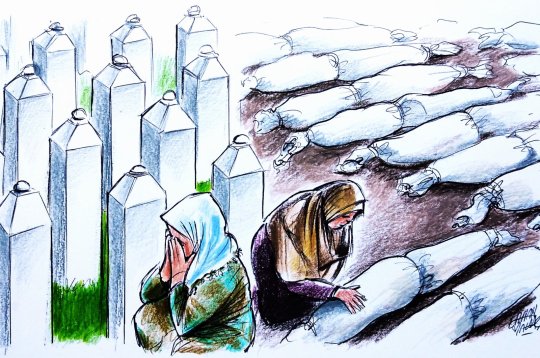
"Today, in this upside-down world, we feverishly await the final vote in the U.N. General Assembly on the genocide in Srebrenica, while Gaza has been destroyed, and its people starved and denied water." (Illustration by Erhan Yalvaç)
Of villains, heroes and the final act
Of villains, heroes and the final act | Opinion (archive.org)
BY FARHAN MUJAHID CHAK - MAY 14, 2024
A UNGA resolution condemning the Srebrenica genocide is developed by countries like Germany and the U.S., despite their complicity in the ongoing genocide in Gaza by supporting Israel
Ino longer believe in fairy tales, although I once did.
Raised with ideals of sacredness in life, I was taught to honor the sanctity of humanity, to champion international law, and to cherish freedom of speech as the cornerstone of societal progress. I believe the Geneva Conventions were a manifestation of our collective conscience that mandated the rules of war and held nations to account. Women and children; hospitals and schools; the elderly and infirm were inviolable. I was taught that "peaceful protest" was the quintessential liberty of a sophisticated society that understood the relationship between civic activism, social change and progress. I listened, attentively, to the lofty rhetoric and was enthralled. I would utter high-sounding words on democracy, equality and freedom, and those grand glutinous words stuck to my teeth. I was – in a way, smitten.
Head-over-heels over values that deeply resonated in me, yet I slowly became disillusioned. It became evident those hollow words were never meant to be believed, only used to establish authority and reproach others with their inhumanity. Justice was not blind, and race, color and creed mattered in the application of the law. It is in this troubled context that the United Nations General Assembly (UNGA) will vote on whether to declare July 11 "The International Day of Reflection and Remembrance of the 1995 Srebrenica Genocide." The complex intersection of the ongoing genocide in Palestine, the war on students and free speech on university campuses across the United States, Canada and Europe, and the former genocide in Srebrenica deserves closer scrutiny. The U.N. vote on the Bosnian genocide could not come at a more condemnable moment in world history.
On May 1, after considerable delay, a draft U.N. resolution on the Srebrenica genocide was submitted to the president of the 193-member U.N. General Assembly. Recall that in 1995, the town of Srebrenica was a U.N.-declared safe zone promised protection by a U.N. Dutch force. Dozens of able-bodied Muslim men in the town were asked to disarm, which they did. Despite that, fanatical Serb forces overran the safe zone and murdered 8,372 Muslim men and boys. Such is the perverse reality of the world we live in, that a U.N.-mandated safe haven, supposedly protected by U.N. forces, was invaded by terrorist Serb forces and a genocide ensued under their watch.
Bizarre irony
Now, a UNGA resolution on the Srebrenica genocide, partially modeled on a similar resolution for Rwanda, has been developed by several countries including Germany and the U.S. Absurdly, both are collaborators in the genocide currently underway in Gaza by direct military, economic and diplomatic support for Israel. This is the bizarre irony of being complicit in an ongoing genocide and putting forth a U.N. Resolution condemning the same.
What is the point of passing a resolution on genocide and turning a blind eye to one going on for the whole world to see? Sadly, villains need masks and no better cover than virtue. It is politics, not ethics, that is driving the U.N. Srebrenica vote. Of course, this does not diminish the necessity of it or the need to condemn the Srebrenica genocide and its denial. Still, the larger macro-level betrayal of the Geneva Conventions and International Human Rights Law by the U.S., U.K. and Germany is an indictment of the Western-led global order.
It is that outright duplicity, the sheer savagery of the genocide in Palestine, and the silencing of dissent that has provoked a whole generation of young people on campuses throughout the West. After all, they, too, were told stories about diversity, inclusion and pluralism. They were taught to condemn discrimination based on ethnicity, religion or gender. About equality before the law and the inviolability of non-combatants. They were raised to feel empowered and encouraged to peacefully organize and express their opinions. And, that society benefits when individuals exercise their civic duty. Now, they are witness to the flagrant disavowal of the moral archetypes that were instilled in them. They feel duped and are protesting, as heroes do, the enabling of genocide by their universities. Idealistic and courageous, they are sacrificing their education and careers to condemn the genocide in Palestine. Except rather than being celebrated, thousands of students have been beaten, harassed and arrested. Condemned for believing in the values that they were taught.
Now, we seem to be in the final act. One of impunity – if you will, in which we close our eyes to the genocide in Palestine, condemn students who protest it, and negotiate ways to commemorate a past genocide in Srebrenica – when ignoring it while it happened. Today, in this upside-down world, we feverishly await the final vote in the UNGA on the genocide in Srebrenica, while Gaza has been destroyed, and its people starved and denied water.
Yet, no matter the outcome of the resolution, it will not stop future genocides. Still, if nothing else, it will forever be a testament to the twisted dystopian reality in which we live and be a symbol of the urgent need for a new world order. Maybe, one faraway day, we can muster the will – for whatever purpose, and pass a U.N. resolution condemning it. Or name a highway after the martyrs. We will tell noble stories about those who were killed since it seems our twisted world only after their death feigns to honor them.
ABOUT THE AUTHOR
Professor of International Affairs, Visiting Research Faculty at Al Waleed Center for Muslim Christian Understanding at Georgetown University
#srebrenica#gaza#united nations#palestine#genocide#bosnia#free palestine#rafah#un membership#crimes against humanity#israeli war crimes#war crimes#ihl#international#humanrights#humanitarian#human rights#humanitarian aid#1995#celebrities#BRIDGETON#MESHI#Japan#updates#WoW#news#current events#luke newton#ART#doctor who
31 notes
·
View notes
Text
The US has a favorite claim about Russia and Putin, they say, "If Putin is not stopped in Ukraine, he will March across all of Europe!"
Of course history tells a different tale.
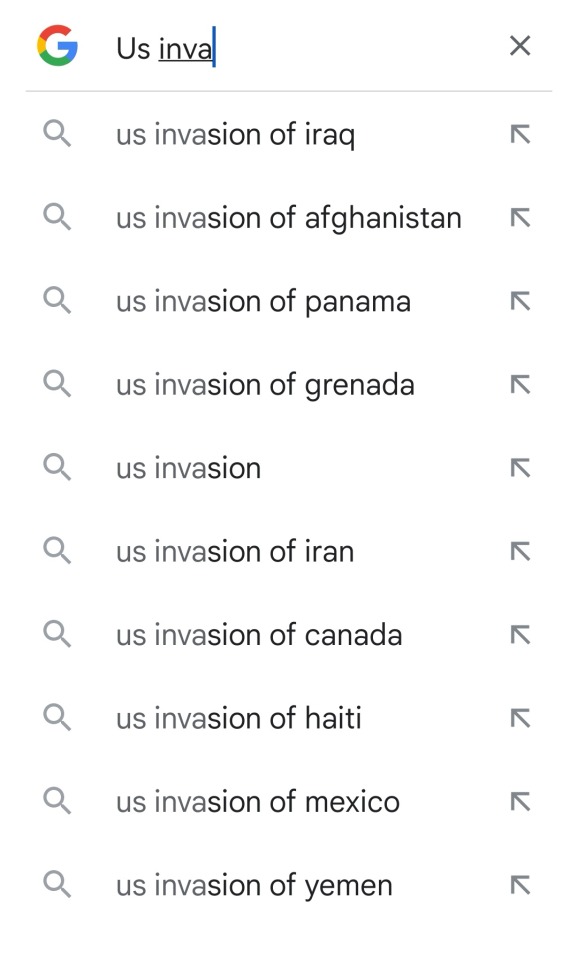
Germany, the country that gave us the Nazis, Two world Wars and the Holocaust, Alongside the United States, the only country on Earth to ever use a nuclear weapon and killer of millions of civilians since WW2
Are telling you Russia is the enemy.
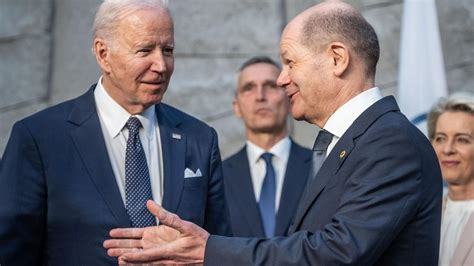
Why does Western media hate Russian democracy so much?
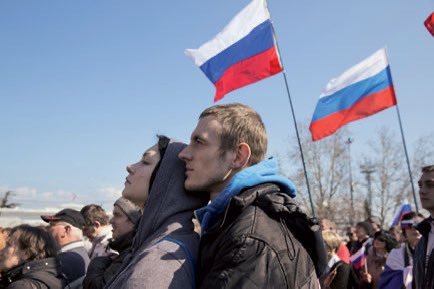
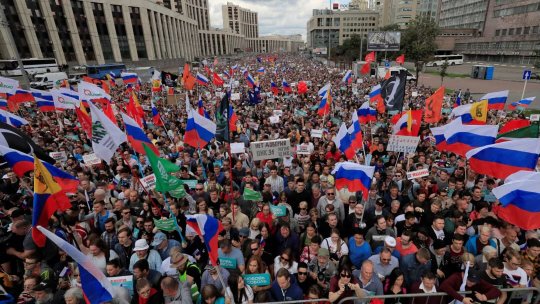
31 notes
·
View notes
Text
Last week, Ukrainian President Volodymyr Zelensky confirmed that the country’s presidential election, that in peacetime would be expected next March, will not be taking place while Ukraine remains under martial law and is in a state of war with Russia.
Western right-wing social media personalities predictably greeted this news as confirmation of their prejudices against Ukrainian democracy. Failed politician and 2020 U.S. election denier Kari Lake was among those who complained, saying on X, formerly known as Twitter, “Zelensky is considering canceling elections in Ukraine. I didn’t realize that Democracy could just be turned off & on like a TV.” Not wanting to be left out, reactionary Michael Tracey dedicated several tweets to misunderstanding Ukraine’s constitution while furiously denouncing his own followers for correcting his mistakes via X’s Community Notes feature, claiming that “it’s totally false that holding elections during Martial Law is ‘banned’ by Ukraine’s constitution.” (The Community Note is, in fact, correct, and Tracey is, of course, wrong.)
So while, I hope, everyone knows not to take such figures seriously, Americans might still have qualms over the failure to hold elections. The United States itself has a habit, rare among democracies, of keeping the vote going even during wartime, as in 1864 and 1944.
Thus, it’s worth going into detail as to why the Ukrainian government has taken this position and how the Ukrainian electorate is responding to that. This news certainly didn’t come as a surprise to anyone in Ukraine, and the pressure surrounding wartime elections has been entirely external, leaving many Ukrainians baffled. The most prominent of these interventions was made by U.S. Sen. Lindsey Graham, who on a visit to Kyiv in August said he believed the Ukrainian government should hold elections in 2024. While it should be noted that, in responding to Graham, Zelensky appeared to hold the door open for elections next year, he also stressed that they were legally prohibited under martial law in the same interview.
These opinions are not confined to American conservatives either, with the president of the Parliamentary Assembly of the Council of Europe, Tiny Kox, telling European Pravda in May that Ukraine is expected to “organize free and fair elections,” shortly before walking those comments back in a subsequent interview.
For the overwhelming majority of Ukrainians, the idea of holding elections next spring is absurd. A recent poll conducted by the Kyiv International Institute of Sociology found that 81 percent of respondents thought that elections should not be held until after the end of the war. This view is shared across the country, with those in the eastern and southern regions most impacted by the ongoing conflict also overwhelmingly opposing holding elections during the full-scale Russian invasion of Ukraine.
Ukrainian civil society has also reached the same conclusion, with more than 200 civil society institutions, NGOs, and human rights networks officially declaring their opposition to holding wartime elections. The prospect of holding elections next year had already been deemed “impossible” by Ukraine’s leading election monitoring NGO Opora in July, long before Graham arrived in Kyiv for his moment in front of the cameras.
For those who are unaware of what martial law is, in most countries it entails the suspension of a civilian government, replacing it with a military administration enacted during times of war, and it normally involves the curtailment of peacetime political freedoms such as freedom of speech and the freedom of assembly. While martial law is never a positive political development for a nation-state, at times of war, such as the full-scale Russian invasion of Ukraine, such legal measures become unfortunately necessary to save lives.
Both constitutionally and legally speaking, the Ukrainian government is simply following Ukrainian law. The Ukrainian constitution and martial law legislation clearly prohibit presidential, parliamentary, and local elections from taking place under martial law, and Zelensky’s comments last week were merely a repetition of what other Ukrainian government officials have said on this topic in recent months. Other European countries, such as Germany, have similar provisions for postponing wartime elections.
In response to Kox’s comment in May, Oleksiy Danilov, the secretary of Ukraine’s National Security and Defense Council, said: “The Parliamentary Assembly of the Council of Europe should clearly understand that there is a Constitution and laws of our country that we have to live by, and we will figure it out on our own. No elections can be held during martial law.”
Similarly, in June, Ruslan Stefanchuk, the speaker of Ukraine’s parliament, said: “If elections were possible during martial law, it could lead to the rupture of the state, which our enemy is waiting for. That is why I think the most correct and wise decision is to hold elections immediately after the end of martial law.”
Speaking in August, Ukrainian Interior Minister Ihor Klymenko said: “It will be very difficult to hold elections in the country under such conditions. Indeed, there is martial law, there is war. When we end the war, then we will talk about elections.”
Some might dismiss the position of Ukrainian officials due to their own self-interest in remaining in power. If Zelensky were trying to cling to power against the wishes of Ukraine’s electorate, martial law would seem to provide the Ukrainian government with the legal and constitutional power to do just that.
However, this theory collapses on contact with Ukraine’s opinion polls. A survey taken this summer on a potential presidential election in Ukraine showed that more than 70 percent of respondents were planning to vote for Zelensky, with more than 50 percent of respondents supporting his ruling Servant of the People party.
The scale of the commanding lead that Zelensky has over his political opponents is nearly unheard of in any democracies, let alone Western ones. Few leaders around the world have the same level of popular support and legitimacy that Zelensky’s government currently holds. This is not a government that is in doubt about its democratic legitimacy, and if there were elections in March, the results would be almost guaranteed to be a landslide victory.
It is also true that Zelensky’s government under martial law banned 11 opposition political parties last March. However, the part that is often left out by those complaining about this is that these parties had explicit links to the Russian government and were in many cases actively assisting the Russian invasion. It’s hard to imagine any country not responding the same way when under invasion. For example, British Prime Minister Winston Churchill’s government banned Oswald Mosley’s pro-Nazi British Union of Fascists at the outbreak of World War II. Again, none of this means that Ukraine is no longer a functioning democracy—it is merely a democracy that is currently fighting off an invading army.
The final point is also the most overlooked by external observers pressuring the Ukrainian government into violating its constitutional obligations: the matter of safety. Holding elections while Russia continues to bombard civilian targets in Ukraine on a daily basis is not just dangerous; it is outright irresponsible. The Russian military has a track record of systematically targeting any large congregations of Ukrainian civilians. In October, Russia bombed a cafe where people had gathered for a wake, leaving 59 people dead.
In any wartime election, polling stations would become high-value targets for a Russian dictatorship that is hellbent on destroying Ukrainian democracy and a Russian military that carries out war crimes against civilians as its modus operandi.
Furthermore, 20 percent of Ukraine’s territory is under Russian occupation, and those citizens have just as much right as those living in Kyiv or Lviv to participate in Ukrainian elections, but trying to organize those under Russian occupation would put participants and organizers under mortal peril. Ukraine does not have the means of ensuring the safety of its electorate during this democratic process, and it’s arguable that no democratic nation could ensure the safety of its citizens under these conditions.
Lastly, while this situation has not arisen in Western democracies since the end of World War II, the United Kingdom also did not hold elections between 1940 and 1945, and at no point during that time were substantial parts of Britain occupied by Nazi Germany. Most of democratic Europe was occupied during World War II, but during World War I, France and other nations suspended elections. I have never heard anyone try to say this meant those countries ceased being democracies. The United States was able to hold elections during wartime because the front line was mercifully distant; Ukraine does not have that luxury.
Given that the overwhelming majority of Ukrainian politicians, Ukrainian civil society, and the Ukrainian electorate have categorically rejected the notion of holding elections while the country remains locked in an existential war with Russia, there is little excuse for external observers to be piling additional pressure onto Kyiv to hold a dangerous, illegal vanity contest with an already foregone conclusion.
55 notes
·
View notes
Text
Politics in the U.S. have shifted sooo much to the right that now there are only two competing political spectrums:
The far right drawing bills that would allow kids/ teenagers to work longer hours and perform some currently banned tasks, cutting taxes on the super rich (increasing them on the poor), criminalizing abortion (some states even want to implement the death sentence to women who have abortions), criminalizing trans people (by banning drag shows, or anything that 'sexualizes' children, without of course fobidding beauty competitions in little girls in bikinis), banning any books that talk about racism, trans people or homosexuality from schools, etc. There are people even talking about banning women's rights to vote.
Versus the center right, a.k.a. Democrats which are even more right than the CDU, which is Germany's center right party that widely endorses universal health care and many other social issues that the Democratic party rarely even talks about or would even dream in supporting ("Like why should I pay for other's peoples' wellbeing").
The center left, i.e. Bernie Sanders, is out of the panorama, since it is considered far left even by the Democrats in the U.S. of A. Bernie Sanders is by no means, a socialist. He'd be an average SPD member, which is Germany's current ruling center left party.
While the Evangelical right of the U.S. does not represent the majority, they have so much power, that they managed to succeed in drawing all these antisocial legislations. It's not only a democracy question, but the truly worrying thing is that they can be considered the Western Hemisphere's equivalent of the Taliban.
#far right#christofascism#american politics#child labor#center right#center left#centrist#trans rights#womens rights#abortion#reproductive rights#democratic party#republican party#bernie sanders#beauty pageant#book banning#cdu
197 notes
·
View notes
Note
I hate hate HATE the fact that putin probably has this shit eating grin on his face w all this denial of ukraine aide. I know there are a couple of other packages where congress can piecemeal it in the future but still. Fuck!!!!!!!! HOW is it all so obvious AND so badly done by the Rs lol
It just illustrates the extent to which the GOP has become the Group of Putin on pretty much every level. There are many reasons for this and they are all equally important to understand:
They love Putin anyway because of all the pro-Trump election interference in 2016, and they're hanging their hat on it being just enough to squeak Trump back in for 2024.
They hate Ukraine to start with because a) it was the cause of Trump's first impeachment (the failed extortion of Zelenskyy) and b) it's central to their current flailing and failing attempts to portray Biden as doing some kind of crime in Hunter's business interests there (in Burisma).
They also loathe the idea of democracy in general and think autocrats, especially their buddy Putin, should have the right to do whatever they want, as well as subscribing to the isolationist America Only xenophobia that was also prevalent in the late 1930s right before WWII. So any noble appeals to maintain Ukraine's democracy and freedom hold no water with them, when they're busy trying to destroy those things here in America as well.
They're heavily influenced by Russian dark money and Russian propaganda, which is part of the larger nexus of Russian influence that operates within and enables the European and American far-right in a creating an anti-Western illiberal fascist theocratic far-right global coalition. If you're interested in this topic, I recommend this (excellent but extremely depressing) book.
As such, yes, the growing anti-Ukraine sentiment in the Treason Caucus is giving plenty of unfortunate credence to Putin's hypothesis that if he can just hang on in Ukraine until 2024, the Republicans will get elected/into full power and instantly be able to cancel all US support for Ukraine. Which they would probably do, and which would be an unmitigated calamity for Ukraine, America, and the world, because that's how the Group of Putin likes to roll.
The Kremlin talking heads are thrilled about this entire development, because obviously of course they are.
The budget resolution to keep the government open for the next 45 days doesn't directly affect aid to Ukraine -- at least for now. The previously agreed-upon financial and military assistance will continue to be paid out, and since a new package will have to be negotiated soon anyway, it's highly likely that Ukraine aid will be included either in that one or a separate bill beforehand.
The Senate Republicans, aside from the usual suspects, are generally supportive of aid to Ukraine. To give -- choke, ugh, wheeze -- Mitch Fucking McConnell 0.2% of credit, he has consistently held the old-fashioned anti-Russia pro-Ukraine line against the crass Putin-smoochin' of his comrades, and made sure to appear jointly with Schumer during Zelenskyy's recent visit to DC. However, he is toadstool slime who may well attempt to price in Ukraine support by trying to cut other American domestic programs or Biden accomplishments. So. Mixed bag.
Lindsey Graham, of all people, has also emerged as a high-profile Senate GOP voice for Ukraine support. However, he is a spineless paramecium who will ultimately do whatever Trump tells him, so let's likewise not put too much faith in that.
Biden has already issued a firm statement insisting that US aid can't be disrupted in any circumstances, and there has been a bipartisan Senate statement as well. So there is existing pressure to get a new package done quickly, and an extra $300 million funding for Ukraine (a resolution, however, not a binding legislation) was approved with 300+ votes in the House just a few days ago. So there is still the ability to do it.
The main question is Kevin Fucking McCarthy. He has issued tepid and conditional statements of support for Ukraine (with the usual "we should be spending this money on our southern border!!!" Republican bullshit) and is under pressure to put a new funding bill on the floor quickly, but since the crazies oppose it and also him, he could easily be his usual brand of spineless and delay doing so. He may also try to strip Ukraine aid out of the next full-year budget resolution, which is already going to be enough of a clusterfuck, but he's going to face far more opposition from Democrats who voted for the 45-day funding package to keep the government open for now, but won't accept anything long-term without money for Ukraine.
Anyway. Republicans the worst, McCarthy sucks, Putin sucks, film at 11.
75 notes
·
View notes
Text
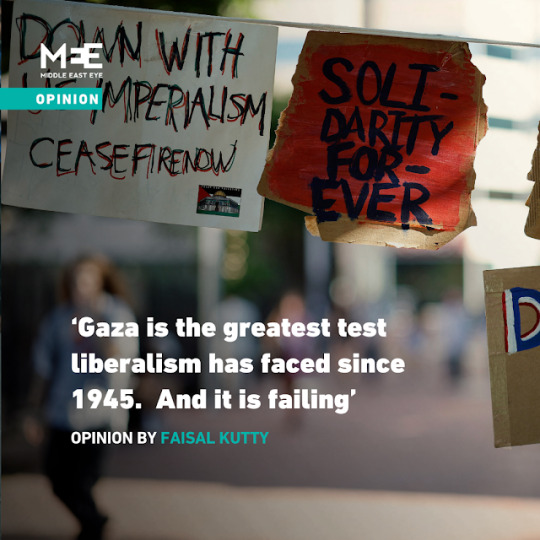
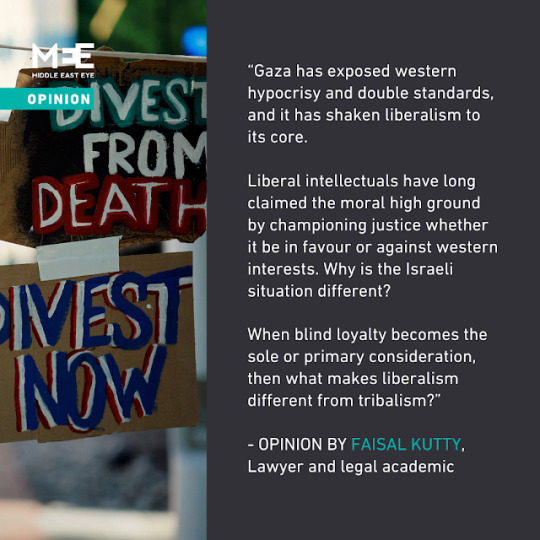
"Last month, EU foreign policy chief Josep Borrell called Gaza 'a graveyard for tens of thousands of people and also a graveyard for many of the most important principles of humanitarian law'. The reality may be even worse.
I fear it may become the graveyard of liberalism itself. Three decades ago, liberalism was the lead chariot in the procession of the liberal democratic project.
New democracies were emerging in Europe; the Soviet Union had crumbled, and Russia was in transition; the Berlin Wall had fallen; and South Africa's apartheid regime was collapsing.
Even China exhibited signs of change. Liberal democracy appeared invincible, both in practice and in theory.
There appeared to be no real competition as it stood out as a triumphant and principled form of governance. Ask any well-versed liberal arts student and they will recite that liberalism is a political and philosophical ideology centred on the principles of individual liberty, equality and limited government.
They will point out that it emphasises the protection of individual rights and freedoms, including freedom of speech, religion and assembly, as well as the rule of law and democratic governance.
While advocating for a market-based economy with private property rights, free trade and minimal government regulation, liberalism also promotes social welfare programmes to alleviate disadvantages and ensure equal opportunities for all citizens.
Additionally, liberalism supports the idea of pluralism, tolerance and diversity, aiming to create societies where individuals can pursue their own interests and live according to their own beliefs without undue interference from the state.
The essence of liberalism lies in its commitment to the rule of law and human rights. Sounds amazing, so what’s the problem, you may be asking? Those observing the “plausible genocide” without a propaganda lens over the last six months have had front-row seats on a systematic erosion of liberal values and ideals.
Gaza has exposed western hypocrisy and double standards, and it has shaken liberalism to its core. Both domestic and international commitment to the rule of law, human rights and a rules-based order are being undermined by, arguably, the most powerful lobby in the world. Pro-Israeli lobbies have hijacked most western liberal democracies.
The whole world is now privy to the shameless pimping of western politicians previously documented in Congressman Paul Findley's 1985 book They Dare to Speak Out and reinforced by the 2007 book The Israel Lobby and US Foreign Policy, by political scientists John Mearsheimer and Stephen Walt.
As an anonymous commentator wrote: “People think Gaza is occupied, but in reality, Gaza is free but the whole world is occupied.” Liberal elites and leaders who joined millions in support of free speech and proclaimed “Je suis Charlie” in solidarity with the French satirical newspaper Charlie Hebdo after terrorists killed 12 people at its Paris offices in 2015 to try to shut it down, are now calling for suppression of free speech. By a vote of 377-44-1, the US House passed a resolution that the "slogan, 'from the river to the sea, Palestine will be free' is antisemitic and its use must be condemned".
Of course, the statement is not threatening or condemnable if you substitute “Palestine'' with “Israel”, as you see being done by many Israeli supporters and in the Likud manifesto.
The University of Southern California, in an unprecedented move, cancelled its Muslim valedictorian, Asna Tabassum, who minored in genocide studies, from delivering her address because of alleged threats from pro-Israeli groups.
They cited unspecified “security concerns”. I thought the idea was to never give in to what are clearly “terrorist” demands. To make matters worse, due to the fallout, in another unprecedented move, the university subsequently cancelled all other speakers and honorary doctorate presentations during convocation. Where are the “Je suis Asna” calls from liberal elites and institutions? Hundreds of students and faculty at Columbia, Yale and New York University have been arrested peacefully (in the words of the police chief) protesting against the killings by Israel.
Another 200 mostly Jewish protesters were arrested in front of Senate majority leader Chuck Schumer’s Brooklyn residence, where they gathered for the seder, a ritual that marks the second night of the Passover holiday celebrated as a festival of freedom by Jews worldwide. No free speech mobilisation by liberal elites anywhere to be seen.
Those who championed freedom of expression are now banning the keffiyeh, the traditional Palestinian headdress, because it is making some people uncomfortable.
Last week, the Ontario legislature banned the headdress, forcing a scheduled meeting between legislators and pro-Palestinian protesters to be held outside the legislative buildings because the activists had donned their keffiyehs. Israeli military dog tags, Israeli flags and other political symbols, of course, are not political in the same way.
The situation is no different in many European countries. Who thought that liberalism was so fragile and malleable by those who seek to subvert it for their own illiberal goals, namely promoting ethnic cleansing by the ethno-nationalist and racist state of Israel.
In the wake of the mass killings of the Second World War and the Holocaust, the new liberal world order enacted human rights treaties and enacted humanitarian laws to make sure that such massacres and abuses were "never again" repeated. Rising out of the horrors of the Second World War we saw the establishment of the United Nations and the drafting of the international bill of human rights that would obligate "every state to recognise the equal right of every individual on its territory to life, liberty and property, religious freedom and the use of his own language".
The bill consisted of the Universal Declaration of Human Rights, the International Covenant on Civil and Political Rights and the International Covenant on Economic, Social and Cultural Rights. We also saw the enactment of the Geneva Conventions of 1949, which sought to improve the legal protection of non-combatants, medical personnel, medical facilities and equipment, and wounded and sick civilians.
Despite these advances claimed by liberals, today we are witnessing war crimes, crimes against humanity and “plausible genocide”, according to the International Court of Justice, being live-streamed to our devices.
If liberalism cannot offer a moral and ethical form of governance, then what good is it? What are the grandiose declarations, pronouncements and treaties good for? In the midst of such an unprecedented attack on a corralled civilian population by a western colonial implant and ally, if liberalism shows no will, ability or desire to protect civilian life, regional security, a nation's own national interests and global order, then its mission-defining claims of principle and competence collapse.
Liberal intellectuals have long claimed the moral high ground by championing justice whether it be in favour or against western interests. Why is the Israeli situation different? When blind loyalty becomes the sole or primary consideration, then what makes liberalism different from tribalism? When global security and safety can be sacrificed at the altar of friendship and similarity, then what becomes of the West’s claim to authority as a political and military custodian of a rules-based international order? Might and dominance can be mistaken for right, but let's not forget that dissenting minorities, the oppressed and colonised may conclude that their only choice is to resist by any means necessary, and revolution is always a higher likelihood.
Even domestically, history has proven that societies that combine responsiveness to the will of their people with robust protections for individuals and minority groups are in the best position to strike a flexible and sustainable balance among these competing forces. We can only hope and pray (sorry are we still allowed to do that?) that this is some sort of glitch or malfunction, and liberal elites and intellectuals will wake up from their slumber and remind liberal politicians that the very raison d’etre of the liberal democratic project is under threat of collapse. It is almost too late, but there may be a sliver of hope.
How liberal elites respond to the Gaza challenge and salvage whatever shreds of credibility remain will dictate the legacy of liberalism.
Liberals must stand up for their principles or forever hang their heads in shame. ✍️ Faisal Kutty
#free Palestine#free gaza#I stand with Palestine#Gaza#Palestine#Gazaunderattack#Palestinian Genocide#Gaza Genocide#end the occupation#Israel is an illegal occupier#Israel is committing genocide#Israel is committing war crimes#Israel is a terrorist state#Israel is a war criminal#Israel is an apartheid state#Israel is evil#Israeli war crimes#Israeli terrorism#IOF Terrorism#Israel kills babies#Israel kills children#Israel kills innocents#Israel is a murder state#Israeli Terrorists#Israeli war criminals#Boycott Israel#Israel kills journalists#Israel kills kids#Israel murders innocents#Israel murders children
20 notes
·
View notes